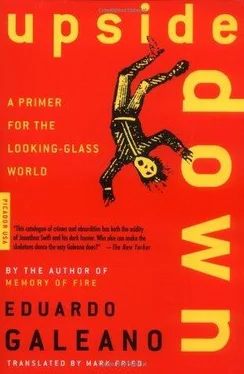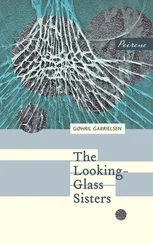Talismans against loneliness or invitations to crime? Car sales parallel sales of weapons, and cars could well be considered a form of weapon: they are the principal killers of young people, with guns a close second. Every year cars kill and wound more people in the United States than all the U.S. soldiers killed and wounded throughout the long war in Vietnam, and in many states a driver’s license is all you need to buy a machine gun and riddle the entire neighborhood with bullets. A driver’s license is also required to pay by check or to cash a check, to sign for documents or notarize a contract. A driver’s license is the most common ID: cars give people their identity.
North Americans enjoy some of the cheapest gasoline in the world thanks to sheiks in dark glasses — kings straight out of light opera — and other allies of democracy whose business it is to sell oil at a bargain, violate human rights, and buy U.S. weapons. According to the calculations of the Worldwatch Institute, if ecological damages and other “hidden costs” were taken into account the price of gasoline would at least double. In the United States gasoline is three times as cheap as in Italy, the second-most-motorized country in the world, and each American burns on average four times as much gas as the average Italian, which is to say, a lot.
Paradise
If we behave ourselves, it will come to pass. We will all see the same images and hear the same sounds and wear the same clothes and eat the same hamburgers and enjoy the same solitude in our houses all alike in neighborhoods all alike in cities all alike where we will all breathe the same garbage and serve our cars with the same devotion and carry out the orders of the same machines in a world that will be marvelous for all who have no legs or wings or roots.
U.S. society, afflicted with autoitis, generates a quarter of the worst gases that poison the atmosphere. Although cars and their unquenchable thirst for gasoline are mostly to blame, it’s politicians who give cars the right to roll and rule in exchange for money and votes. Every time some fool suggests raising gas taxes, the Detroit Big Three (General Motors, Ford, and Chrysler) scream to the skies and with broad popular support mount million-dollar campaigns decrying this vile threat to public freedom. And when a wayward politician feels wracked by doubts, the companies prescribe an infallible remedy: as Newsweek once put it, “The relationship between money and politics is so organic that seeking reform is tantamount to asking a doctor to perform open-heart surgery on himself.”
Rarely is any politician, Democratic or Republican, willing to commit sacrilege against a national way of life that venerates machines, squanders the planet’s natural resources, and equates human development with economic growth. Advertising extols the miracles that way of life performs, miracles the entire world would like to deserve. In the United States everyone can achieve the dream of owning a car, and many can trade their vehicles in regularly for new ones. Can’t afford the latest model? This identity crisis can be overcome with aerosol sprays that make your autosaurus purchased three or four years ago smell as good as new.
Like death, old age is a sign of failure. The car is the one eternally youthful body you can buy. It eats gasoline and oil in its own restaurants, has its own pharmacies with its own medicine, and its own hospitals for diagnosis and treatment. It even has its own bedrooms and cemeteries.
Cars promise people freedom — highways aren’t called “freeways” for nothing — yet they act like traveling cages. Despite technological progress, the human workday continues to lengthen year after year and so does the time required to get to work and back in traffic that moves at a crawl and shreds your nerves. You live in your car and it won’t let you go. “Drive-by shooting”: without leaving your speeding car you can pull the trigger and shoot blindly, as some people occasionally do in the Los Angeles night. “Drive-thru teller,” “drive-in restaurant”: without getting out of your car you can get money from the bank and eat hamburgers for supper. And without leaving your car you can also get married—“drive-in marriage.” In Reno, Nevada, the car rolls under arches of plastic flowers, a witness appears at one window, the pastor at the other and, Bible in hand, he declares you man and wife. On your way out a woman dressed in wings and a halo gives you your marriage certificate and receives your “love donation.”
The automobile, that buyable body, moves while the human body sits still and fattens. The mechanical body has more rights than the one of flesh and bone. As we all know, the United States has launched a holy war against the devil tobacco. I saw a cigarette ad in a magazine with the required public health warning: “Tobacco smoke contains carbon monoxide.” But the same magazine had several car ads and not one of them warned that car exhaust, nearly always invisible, contains much more carbon monoxide. People can’t smoke. Cars can.
Flight/3
In the sewers, under the asphalt, the abandoned children of the Argentine city of Córdoba make their home. Once in a while they surface to grab pocketbooks and wallets. If the police don’t catch them and beat them to a pulp, they use their booty to buy pizza and beer to share. And they buy tubes of glue to inhale.
Journalist Marta Platía asked them what they felt like when they got high.
One of the kids said he whirled his finger and created wind: he pointed at a tree and the tree swayed in the wind he sent forth.
Another recounted that the world filled up with stars and he flew through the sky; there was sky above and sky below and sky to the four corners of the earth.
And another said he was sitting beside the sleekest and most expensive motorcycle in the city. Just by his looking at it, it was his; a harder look and he was riding it full speed while it grew and changed colors.
Rights and Duties
Although most Latin Americans do not have the right to buy a car, it’s everyone’s duty to pay for that right. For every thousand Haitians, barely five are motorized, but Haiti spends a third of its foreign exchange to import vehicles, spare parts, and gasoline. So does El Salvador, where public transportation is so disastrous and dangerous that people call buses “caskets on wheels.” According to Ricardo Navarro, a specialist in these matters, the money that Colombia spends every year to subsidize the price of gasoline would pay for handing out 2.5 million bicycles.
Cars are like gods. Born to serve people as good-luck charms against fear and solitude, they end up making people serve them. The church of the sacred car with its U.S.-based Vatican has the entire world on its knees. The spread of car gospel has proven catastrophic, each new version deliriously multiplying the defects of the original.
A tiny proportion of the world’s cars circulate on Latin America’s streets, but Latin America boasts some of the most polluted cities on the globe. The structures of hereditary injustice, laced with fierce social contradictions, have given rise to cities that are outsized monsters beyond any possible control. The imported faith in the four-wheeled god and the confusion of democracy with consumption have been more devastating than any bombing campaign.
Never have so many suffered so much for so few. Disastrous public transportation and the absence of bicycle lanes make the use of private cars practically obligatory, but how many people can enjoy the luxury? Latin Americans who don’t own a car and can never hope to buy one live engulfed in traffic and suffocated by smog. Sidewalks shrink or disappear altogether; distances increase; more and more cars cross paths while fewer and fewer people meet. Not only are buses scarce, in most Latin American cities public transportation consists of just a few rust-heaps that spew out deadly plumes of exhaust, adding to pollution instead of alleviating it.
Читать дальше











